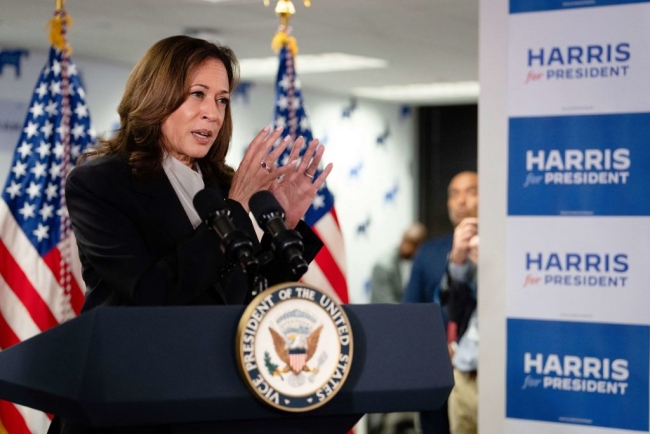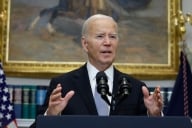You have /5 articles left.
Sign up for a free account or log in.

Democrats coalesced behind Vice President Kamala Harris, who is seen as the most likely candidate to become the Democratic presidential nominee.
President Biden’s decision Sunday to drop his re-election bid cleared the way for Vice President Kamala Harris to take his place at the top of the ticket.
It’s not yet clear how, or how much, a President Harris might differ from Biden on higher education policy. Like most vice presidents, she’s generally been in lockstep with the president and championed their administration’s policies. She’s pushed its efforts to forgive student loans and make payments more affordable for borrowers. As a senator, she signed on to legislation to make community college free (also a Biden proposal) and help colleges pay for students’ basic needs, such as food, housing and transportation. Prior to that, as attorney general for California, she uncovered predatory practices at some for-profit colleges and pushed for cancellation of loans taken out by students who were defrauded.
After Biden endorsed her as his successor, Democrats quickly began to unify behind the vice president, making her the likely candidate to face Donald Trump in November. Delegates will choose the party's nominee by Aug. 7 in an online vote.
Education Secretary Miguel Cardona wrote on social media that he was “all in” for Harris, who also quickly picked up other endorsements from prominent Democrats and unions such as the American Federation of Teachers.
“Vice President Harris has fought alongside Joe Biden to deliver historic accomplishments and create a better life for all Americans,” AFT president Randi Weingarten said in a statement Sunday night. “She has a record of fighting for us—fighting to lower the costs we pay, for reproductive rights, for worker empowerment and to keep communities safe from gun violence.”
Observers say that a potential Harris administration would likely build on the current administration’s ambitious agenda for higher education, which aimed to better protect students’ rights and their investments in their education. That’s included overhauling student loan programs—making it easier for millions of borrowers to access relief—and stepping up scrutiny of programs that don’t pay off for graduates.
Sarah Spreitzer, vice president and chief of staff of government relations at American Council on Education, said implementing the Biden administration’s new Title IX rule, which takes effect Aug. 1, and student loan forgiveness would likely be key issues for Harris.
Likewise, Michael Itzkowitz, who worked in the Obama administration and now leads the HEA Group, a research and consulting agency focused on college access and success, said that he sees the potential Harris administration as a second Biden term. The current administration has worked to make it “easier for students to stay above water on their loans,” he said, and has been aggressive in ensuring students get value out of their postsecondary education while protecting those who did not. He expects all that to continue.
“They’ve done an extraordinary amount in terms of laying the groundwork,” he said. “[A Harris administration] will now be in charge of implementing many of the ideas that they put in place throughout the past four years.”
While her higher ed agenda may come into sharper focus in the months ahead, here are four things to know about what’s Harris has emphasized throughout her political life.
Connecting With Younger Voters
During her time as vice president, Harris has regularly reached out to younger voters. Last fall, she embarked on a speaking tour of eight college campuses, encouraging students at each stop to vote and fight for their rights. At the different stops, she attracted large crowds and touted the administration’s policies on student loan forgiveness, reproductive rights and climate change.
“There are going to be people who are going to try to shut you up,” she said last fall at Hampton University, where she kicked off the tour. “They’re going to be people who literally try and turn off the mike when you’re talking. And don’t you ever let anybody silence you. Don’t you let anybody convince you that your truth is not a truth that must be spoken.”
Voters of Tomorrow, a Gen Z–led organization that works to engage young Americans in politics and government, endorsed Harris for president Sunday while praising Biden for “delivering the most pro-youth agenda in American history.”
“As vice president, Kamala Harris has been one of Gen Z’s fiercest champions. She has toured the nation to engage young people in the fight for reproductive rights, economic justice, climate action, voting rights, and LGBTQ+ equality,” the organization said in a statement.
Kristin McGuire, executive director of Young Invincibles, an advocacy group focused on amplifying the voices of young adults, said the excitement about Harris’s campaign on social media following Biden’s announcement shows that “young people are actually not apathetic.” She expects younger voters to turn out this fall as they have in recent presidential elections. That’s partly because they overwhelmingly support debt relief.
“President Biden has been very, very diligent in ensuring that we get our hands around the student debt crisis,” McGuire said. “We are grateful to our president for being able to work so hard on an issue that young people across the country care so much about. So we would love to see that type of work continue.”
Supporting HBCUs
If elected, Harris would be the first graduate of a historically Black university to be president. The Howard University graduate pledged while running for president in 2019 to invest $60 billion in HBCUs. When she was named Biden’s running mate in 2020, HBCU leaders hailed the decision as groundbreaking.
“As a proud graduate of Howard University, I know firsthand that our HBCUs are centers of academic excellence,” Harris said in May. “We know that when we invest in the success of our HBCUs, we are investing in the strength of our nation—today and for generations to come.”
Harris has visited HBCUs frequently as vice president, and the administration has secured a record $16 billion for historically Black institutions over the last four years.
On Monday, Delaware State University president Tony Allen, a co-chair of the President’s Board of Advisors on Historically Black Colleges & Universities, thanked Biden and Harris for their support of HBCUs.
“While many have suggested that they comprehend the importance of America’s HBCUs, no administration, and we do mean NO administration—in the history of our republic—has done more for HBCUs than the Biden-Harris Administration,” Allen wrote in a letter along with Glenda Glover, president emerita of Tennessee State University and the vice chair of the board.
Allen and Glover added that Biden has “forever changed the course of our outstanding institutions.” To Harris, they wrote, “please know that your substantive impact is not lost on us.”
“Your example has taught us that we can set our own table,” they wrote. “While many think that the clarion call of ‘HU’ is reserved for Howard University, we all know it is the rallying cry for Black Excellence, Black Equity, and Black Energy in an America that needs us all.”
Battling For-Profits
Harris spent six years as attorney general of California and used her post to hold accountable for-profit colleges that violated the law.
She investigated for-profit colleges and sued Corinthian Colleges, a for-profit chain that shut down in 2015 under pressure from the Education Department. Some experts credit Harris with drawing attention to the issues at Corinthian. She accused the chain of lying to students and committing securities fraud, among other claims. That lawsuit led to a $1.1 billion judgment.
When Harris ran for president in 2019, a campaign ad contrasted her oversight of for-profit colleges with former president Donald Trump, who ran an unaccredited for-profit university that never received federal financial aid or awarded degrees. In 2017, a federal judge approved a $25 million settlement for students who said Trump University defrauded them.
“She shut down for-profit colleges that swindled Americans,” the narrator says. “He was a for-profit college.”
In her memoir, The Truths We Hold, Harris wrote about the lawsuit, noting that there have been a “rash of corporate predators” who have taken advantage of vulnerable people.
“Among the worst examples of these predators are the for-profit colleges that became the darlings of Wall Street during this time,” she wrote.
Advocating for Loan Forgiveness and Free College
Before Biden came around to the idea of forgiving up to $20,000 in student loans for 40 million Americans—a plan that was later struck down by the Supreme Court—Harris was advocating for loan forgiveness, according to Politico. As a candidate, Harris proposed canceling up to $20,000 in debt for Pell Grant recipients who open a business in a disadvantaged community and operate it for at least three years.
Harris has also repeatedly supported efforts to make community college free. As a senator, she backed legislation from Hawaii Democrat Brian Schatz that would have covered all costs associated with attending a public college.
She was an early co-sponsor of Vermont senator Bernie Sanders’s College for All Act, which would have made community college free for all students and eliminated tuition and fees at four-year institutions for families who earn $125,000 or less a year.
“Almost all students understand the struggle of student loans,” she wrote on social media in 2018. “Enough. It’s time we make college tuition-free once and for all.”








